
Orthopedic surgery vs. anesthesiology is one of the biggest debates among medical students interested in physiology. Both specialties allow you to explore the complex workings of the human body and use your skills to improve patient outcomes. However, they also have significant differences, such as the scope of practice, the work environment, and the training requirements.
How do you decide which one is right for you? I faced the same question as a medical student at Stanford, and I had to balance my personal and professional aspirations. I also had to consider practical factors such as job availability, salary, and training duration/path. In this article, I will provide helpful information and tips to help you make an intelligent decision on orthopedic surgery vs. anesthesiology and find a fulfilling career that matches your interests and abilities.
Orthopedic Surgery vs. Anesthesiology: Salary and Job Security
Orthopedic surgery might be your specialty if you want to earn a lot of money and have a steady demand for your services. But be prepared for a competitive job market, even if you graduate from a prestigious program.
Anesthesiology, meanwhile, offers more job openings. You can easily find a hospital that needs anesthesiologists, and the career outlook is positive, even if the salary is not as high as orthopedic surgery. But anesthesiology also comes with some challenges, such as higher burnout and less job security, which we will discuss later.
According to recent data, orthopedists earn an average annual salary of $573,000, while anesthesiologists have a lower average salary of $448,000. Of all medical specialties, only plastic surgeons have higher average annual salaries than orthopedists, with plastic surgeons earning $619,000.
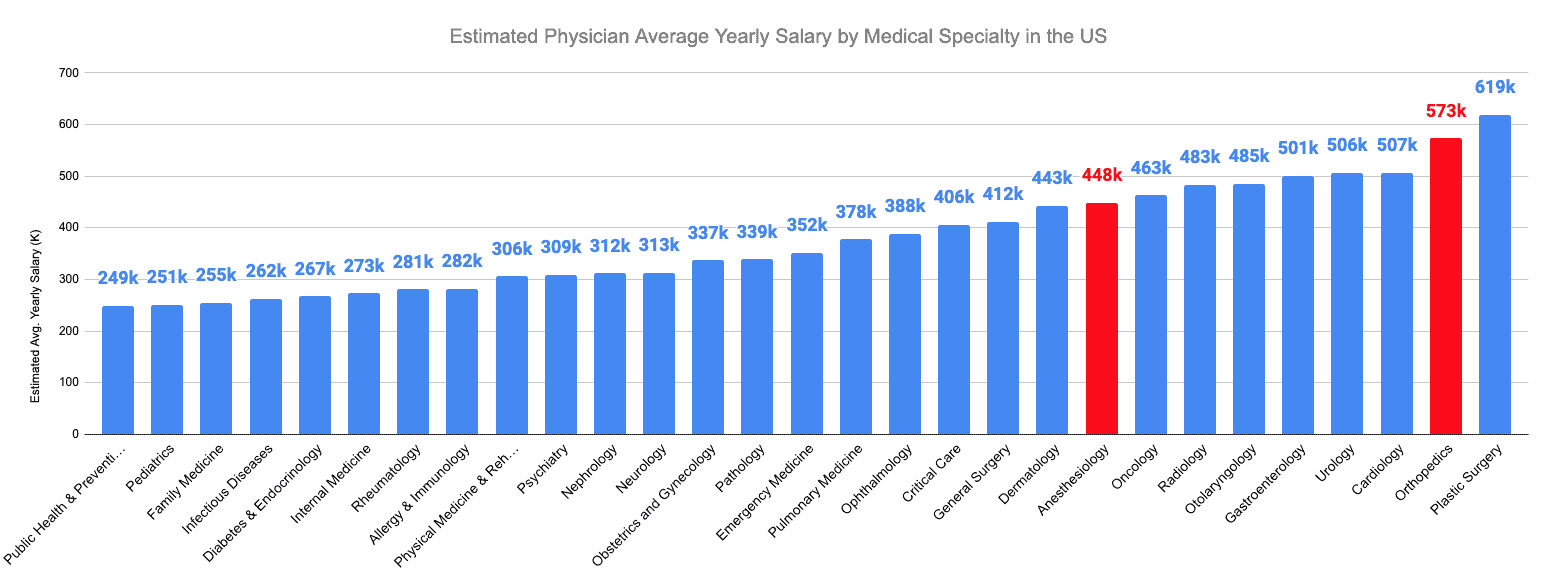
Orthopedists earn $573,000 per year on average, while anesthesiologists earn less with $448,000 annually
Orthopedic Surgery vs. Anesthesiology: Competitiveness
Here we can assess the competitiveness of a specialty by looking at the unmatched rate – the % of people who apply and do not match into their preferred specialty. The unmatched percentage among US Seniors for anesthesiology was 10.5%, making it moderately competitive among US residencies. In comparison, orthopedic surgery was the 2nd most competitive residency in the 2022 Match, with a 34.2% unmatched rate among US Seniors. Only plastic surgery had a higher percentage of 37.3%.
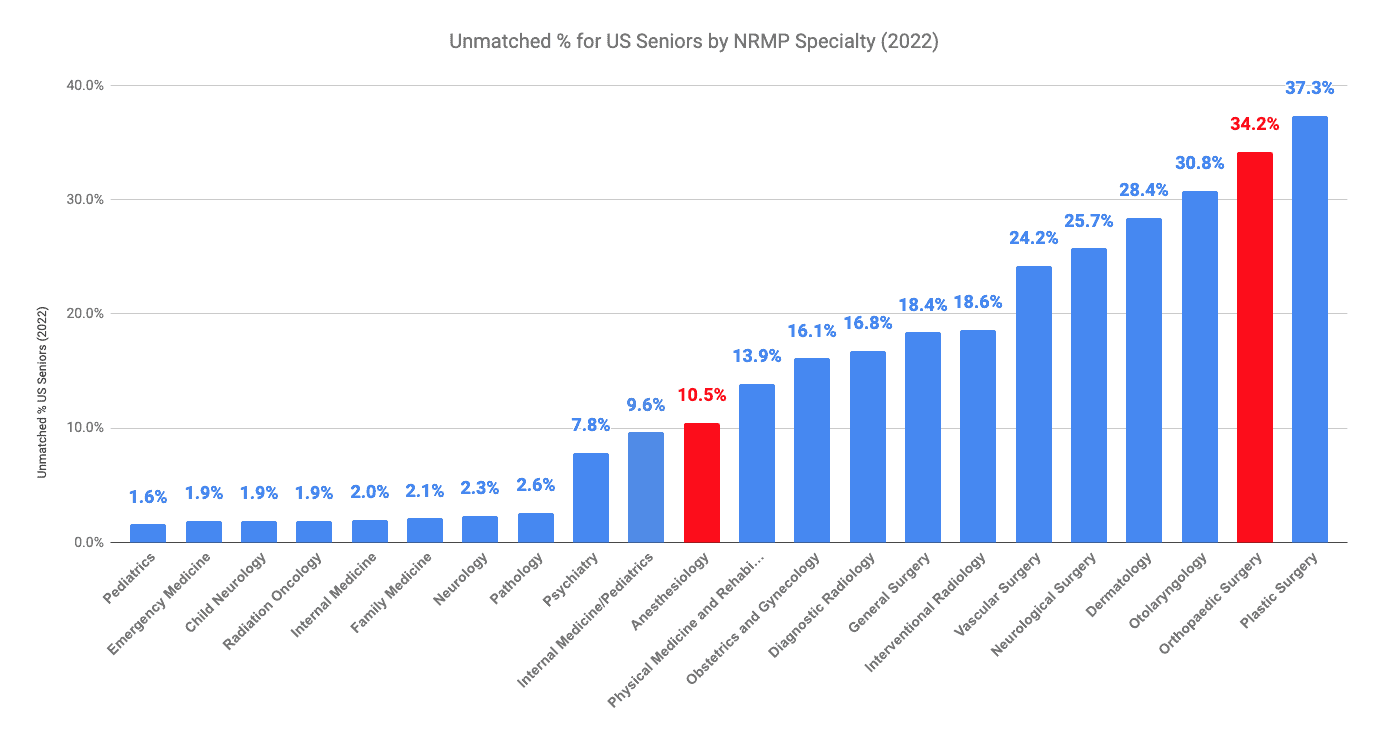
Orthopedic surgery had a 34.2% unmatched rate, while anesthesiology had a 10.5% unmatched rate among US seniors
Training Path: Residency
The training pathways for orthopedic surgery vs. anesthesiology are not the same. Anesthesiology involves a four-year anesthesiology residency. Orthopedic surgery involves a five-year orthopedic residency.
Anesthesiology residencies are typically less competitive than orthopedic surgery residencies. Your USMLE scores, med school, and research are the main things for residency applications. Research is also a big thing for fellowship applications, and your residency program counts more, but your USMLE scores matter much less.
Orthopedic Surgery vs. Anesthesiology: Work-Life Balance
Work-life balance is a crucial factor for many medical professionals. Anesthesiologists often enjoy a better work-life balance due to the nature of their work. They have the ability to “clock out” at a designated time, leading to more predictable schedules. However, it’s worth mentioning that this also means anesthesiologists are thought to be more easily replaced, as they don’t typically maintain a panel of patients like their orthopedic surgery counterparts.
In comparison, orthopedic surgeons often have demanding surgical schedules and may work long hours in the operating room. They may also be on-call for emergencies such as trauma or accidents.
On average, orthopedic surgeons work 52.9 hours per week, which is above the middle of all medical specialties. Anesthesiology averages 51.8 weekly working hours, ranking in the middle of medical specialties.
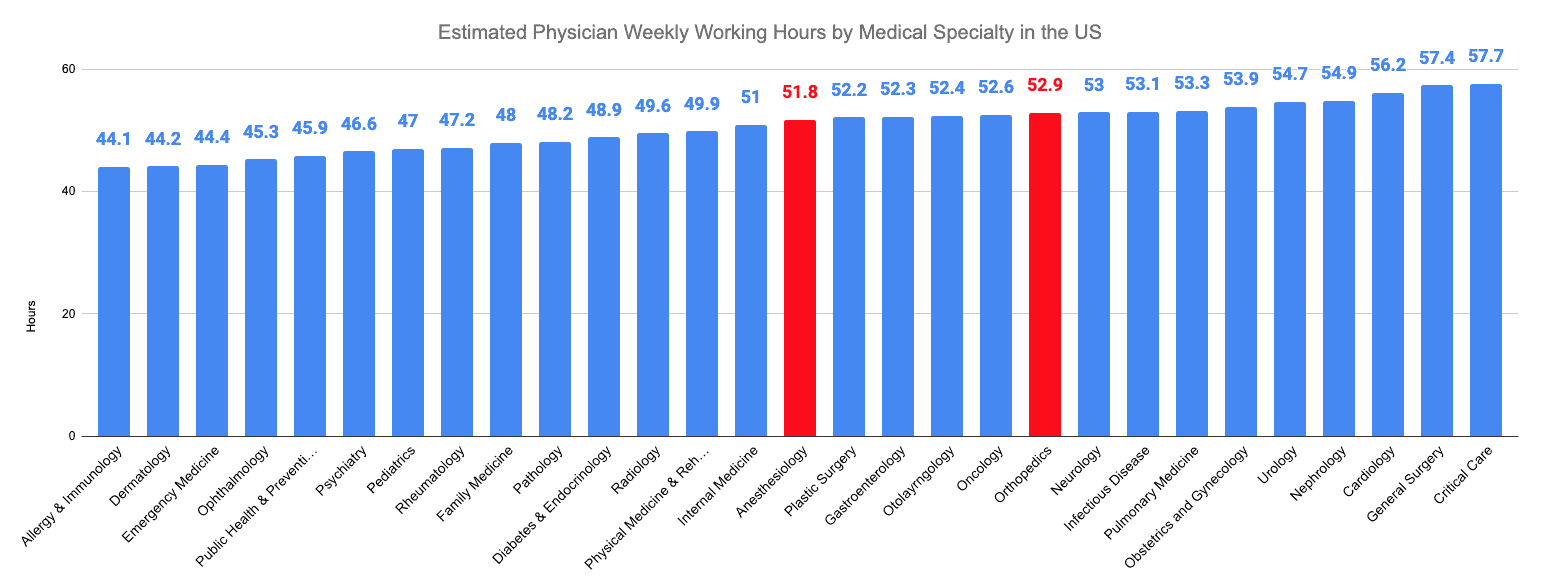
Orthopedists work an average of 52.9 hours per week, while anesthesiologists work slightly fewer hours, at 51.8 per week.
Orthopedists require more documentation, such as referral letters and diagnostic tests, resulting in an estimated 14 hours of admin/paperwork per week. In comparison, anesthesiologists due to less direct patient management have only 9 hours, which is at the lower end of all medical specialties.
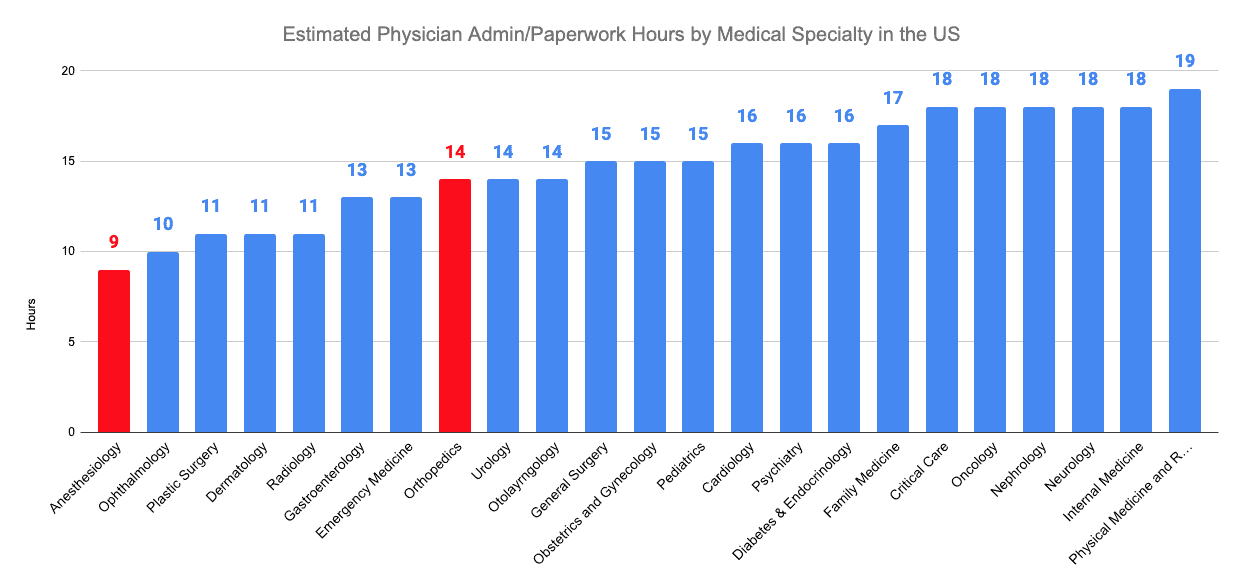
Orthopedists work on admin/paperwork an average of 14 hours per week, while anesthesiologists work fewer hours, at 9 per week.
Training Duration and Subspecialties
The training duration is a key aspect to consider when choosing between orthopedic surgery vs. anesthesiology. Anesthesiology has a four-year training period, while orthopedic surgery has a minimum of five years of orthopedic residency.
After completing an orthopedic surgery residency program, some surgeons may choose to pursue additional fellowships to further specialize in a particular aspect of orthopedic surgery. This can increase the length of your orthopedic surgery training.
Orthopedic Surgery vs. Anesthesiology: Job Satisfaction and Burnout Rates
Job satisfaction plays a significant role in career fulfillment. According to various studies, orthopedic surgery tends to have higher job satisfaction rates than anesthesiology. Many orthopedists express contentment with their career choice and would choose it again if given the chance. Additionally, orthopedic surgery has lower reported burnout rates than anesthesiology.
According to recent data, orthopedic surgery ranked near the upper end of all medical specialties with 95% of orthopedists stating that they would choose the same specialty again, while anesthesiology ranked slightly lower with 87% of anesthesiologists feeling the same way.
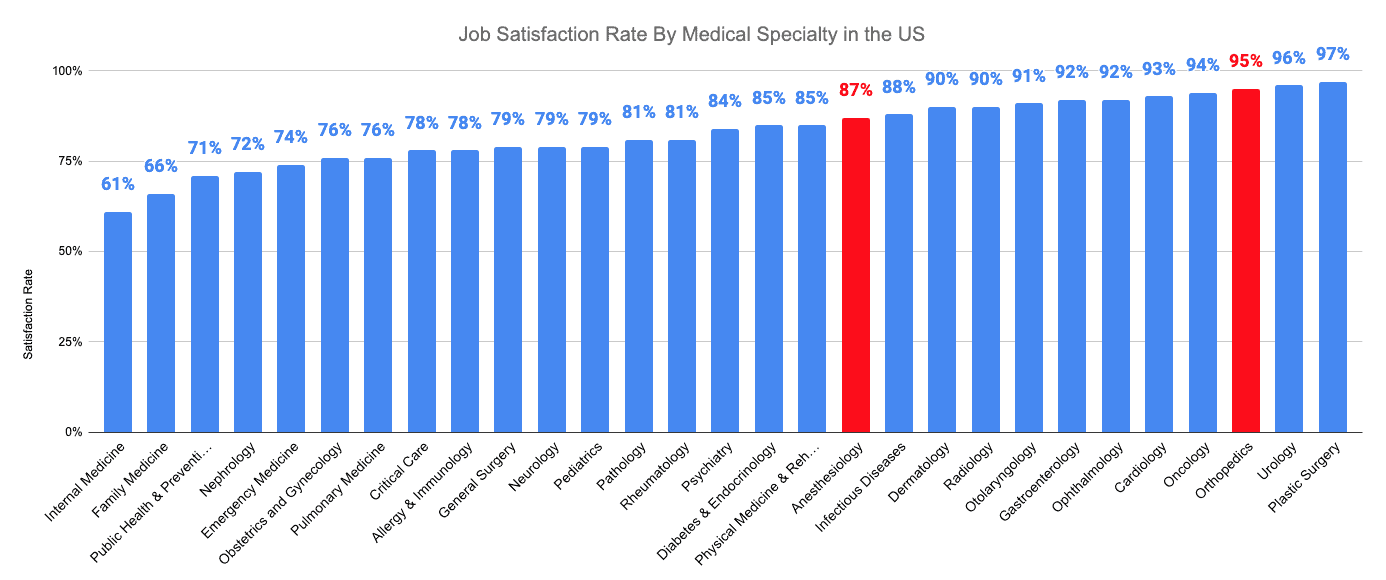
Orthopedists reported a 95% job satisfaction rate, while anesthesiologists reported lower satisfaction with 87%
That being said, the burnout rate for orthopedic surgery was 45% which was near the lower end of all medical specialties. In comparison, anesthesiology had a burnout rate of 55%, ranking above the middle of all medical specialties.
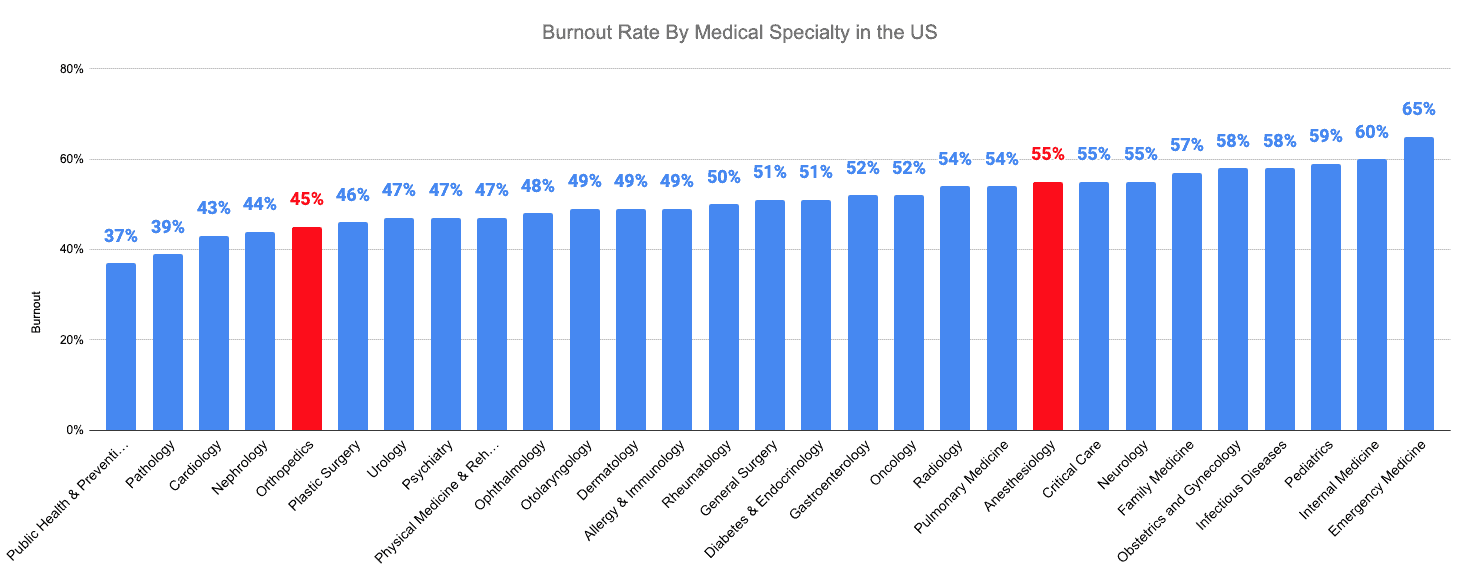
Orthopedists have a burnout rate of 45%, while anesthesiologists have a higher burnout rate of 55%.
Orthopedic Surgery vs. Anesthesiology Comparison
To provide a visual overview, here’s a table comparing orthopedic surgery and anesthesiology:
| Aspect | Orthopedic Surgery | Anesthesiology |
|---|---|---|
| Average Salary | High, especially those focusing on high-demand joint/spine procedures | Competitive income influenced by the complexity and duration of surgeries |
| Job Security | High demand field as population ages. Injuries and sports will ensure job stability. | Steady demand, particularly in surgical and procedural settings |
| Training Path | Typically involves 5 years of orthopedic surgery residency | Typically requires 4 years of medical school, followed by a 4-year anesthesiology residency |
| Lifestyle | Predictable work schedule and increased opportunities for time off, but involve on-call responsibilities for trauma or accident cases | Generally more predictable working hours |
| Administrative Paperwork | Moderate documentation requirements for surgery notes, consults, and orders. | Less paperwork than orthopedic surgery due to less direct patient management |
| Job Satisfaction | Generally high, satisfaction tied to successful surgeries and patient outcomes | Lower |
| Burnout Rates | Low to Moderate, depending on the workload and stress associated with surgical procedures | Higher due to stress, unpredictable schedule disrupting work-life balance, and impact of long OR days. |
| Personality | Detail-oriented, mechanically inclined. Enjoy operative procedures. | Calm under pressure, able to efficiently multi-task and coordinate a surgical team. |
Please note that this table serves as a general comparison. To determine the most suitable career for you, consider your personal and career priorities and goals.
Concluding Thoughts
Choosing the right specialty between orthopedic surgery vs. anesthesiology depends heavily on your priorities. To determine this, try reverse engineering your ideal life and identify your top priority. A helpful exercise is to write down the top five things you want to achieve in your career and personal life. Knowing these priorities will make finding a career that aligns with them easier. Often, the biggest obstacle is not a lack of knowledge about different fields but a lack of self-awareness about our own preferences.







